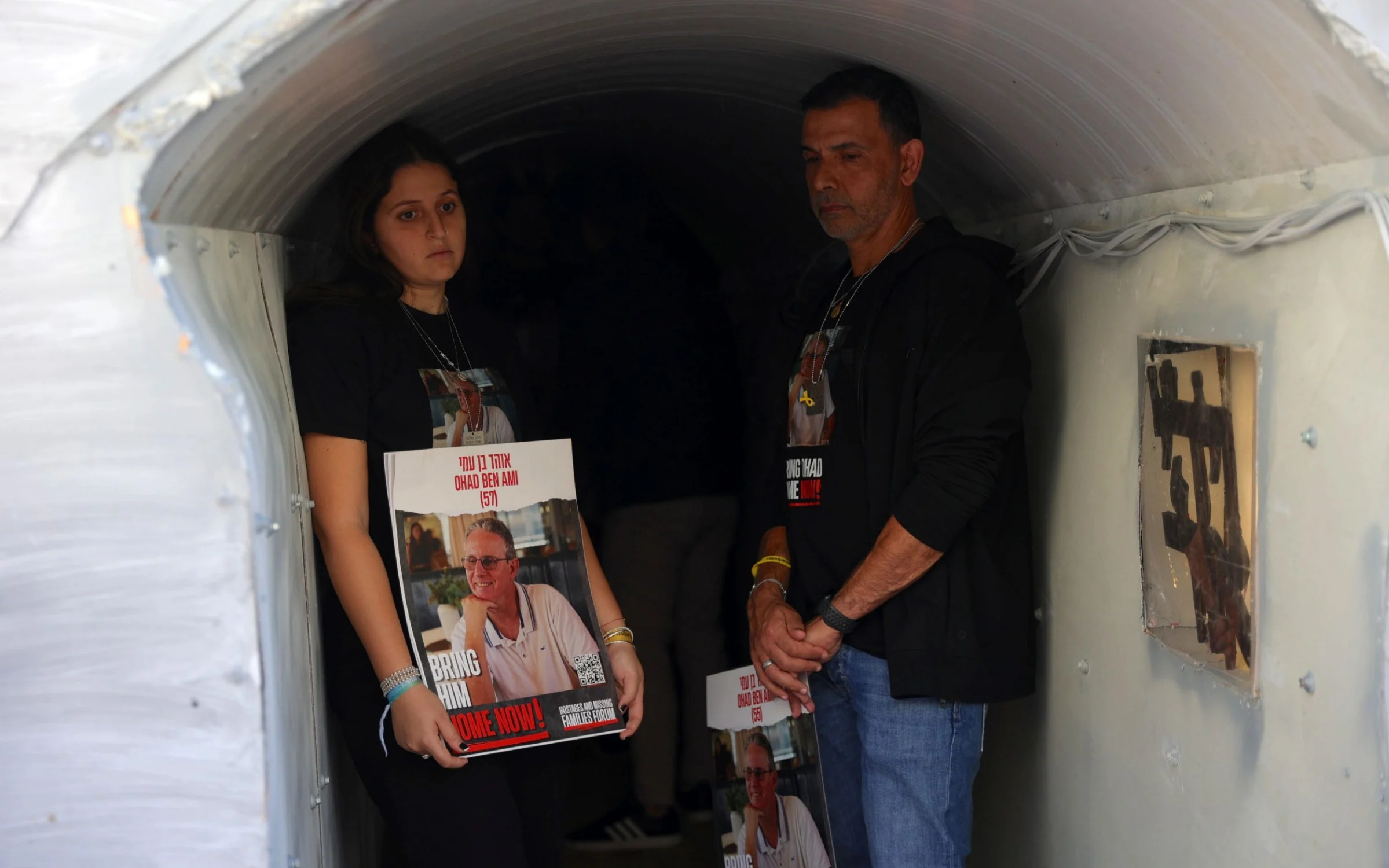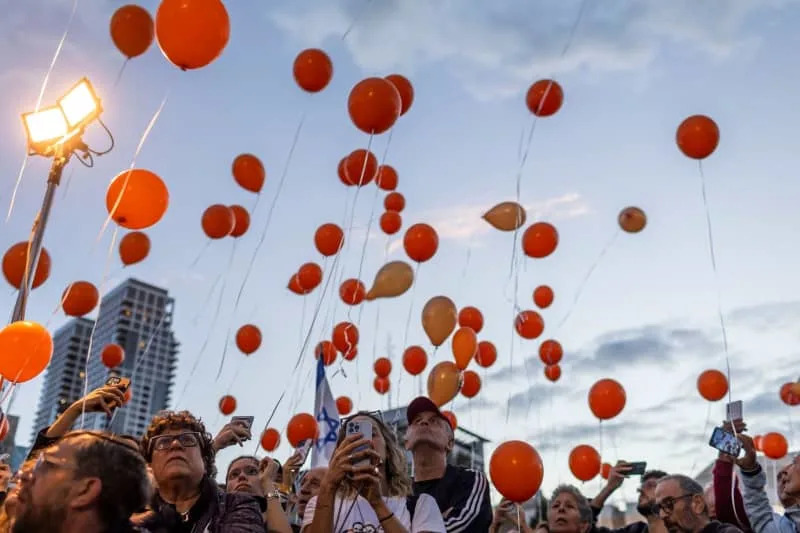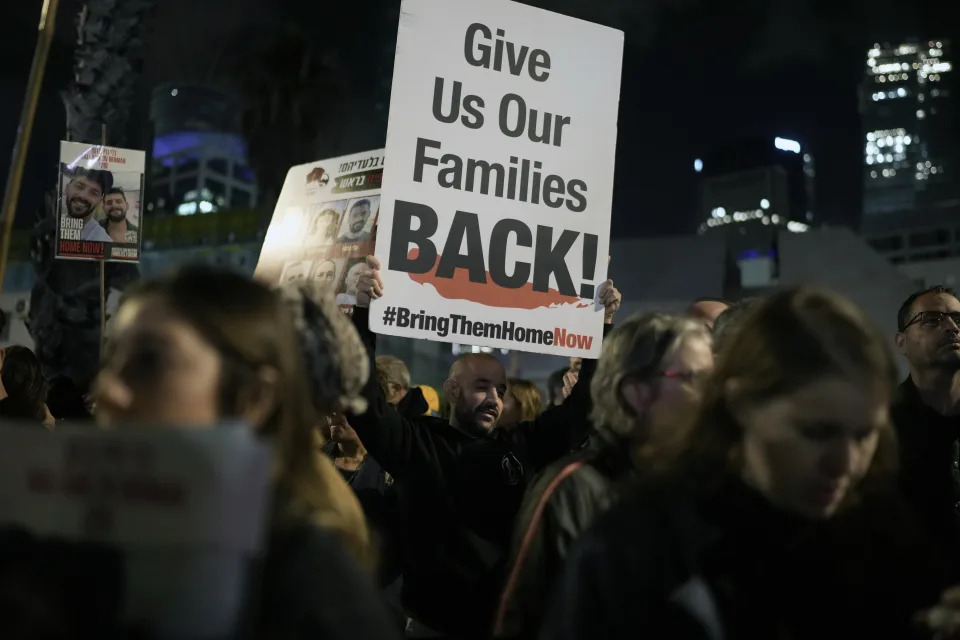Relatives of Israeli captives in Gaza unveiled a replica in Tel Aviv Saturday of the tunnels where they are believed to be held, to mark 100 days since they were seized.
After walking through the mock tunnel outside the Tel Aviv Museum of Art, Eyal Moar said it was only a "small bite" of the ordeal experienced by his uncle Abraham Munder, 79, and the other hostages abducted on October 7.
"We know the conditions are really horrifying -- no fresh air, very little food, no meds, no sun light, they sleep on the floor," Moar told AFP in the central plaza renamed "Hostages Square" by campaigners.
Israeli artist Roni Levavi, who designed the installation, wanted to create "the most faithful reconstruction" of the Gaza tunnels and relied on images from the media, he told AFP.
The interior of the tunnel is dimly lit, there is dirt on the ground and the sounds of gunfire and shelling are constantly played.
This would "give an idea of what the hostages have been feeling for so many days", Levavi said.
"That's the only tunnel in this story that has a light in the end of it," said Inbar Goldstein, who had several relatives released during a week-long truce in November, and several others killed in the initial attack.
She said it was a duty to help the remaining hostages find the light and bring them home.
Palestinian militants took about 250 captives on October 7, 132 of whom Israel says remain in Gaza, including at least 25 believed to have been killed.
The attack by Hamas also resulted in about 1,140 deaths in Israel, mostly civilians, according to an AFP tally based on official figures.
- 'Not enough' -
Although more than 100 hostages were released during the November truce, the fate of the others remains unclear.
On Friday, Israeli officials said they had reached a deal to get medicines to the remaining captives -- which some of the families believed was scant progress.
"It's not enough," said Ella Ben Ami, whose father Ohad Ben Ami, 55, is among those still held.
"I want him home, in hospital, in good healthcare, not in Hamas healthcare."
Israel has pounded Gaza since October 7, killing at least 23,843 people, mostly women and children, according to the territory's health ministry.
The Israeli military often speaks of "terror tunnels" they say Hamas fighters use to move hostages around, as well as to store weapons and shelter from the bombing.
The relatives said the experience of being stuck, even in the mocked-up tunnel, was harrowing.
"I was there for five minutes and I just wanted to run away," said Ben Ami. "I had a choice to run away but they don't."
Israeli hostage families mark anniversary with mock Hamas tunnel
Family members of Ohad Ben Ami, who is still held as a hostage by Hamas in Gaza, hold his picture inside a 30-metre tunnel in Tel Aviv .
Israeli hostage families recreated a Hamas tunnel to mark 100 days since their relatives were first kidnapped by the terror group.
Families built the mock tunnel in Hostage Square, Tel Aviv, to raise awareness for their loved ones who are still being held captive more than three months after the October 7 attacks.
The cramped and dimly-lit tunnel, unveiled on Saturday, was built to imitate the conditions the hostages have had to endure inside the Hamas underground tunnel network.
Ella Ben Ami, 23, whose father Oded, 55, is still being held in Gaza, told Channel 12 she was “shaking” as she walked through the underground passage.
“For nearly 100 days [the hostages] haven’t been able to leave this,” said the 23-year-old, whose mother, Raz, was kidnapped separately but then freed in November.
She told NBC News it was “hard to keep the hope” for “so many days.”
Many of the remaining 132 Israeli hostages are elderly and have chronic illnesses that require daily medications. Their families have petitioned the International Committee of the Red Cross to visit the hostages to deliver medicine and inspect their conditions.
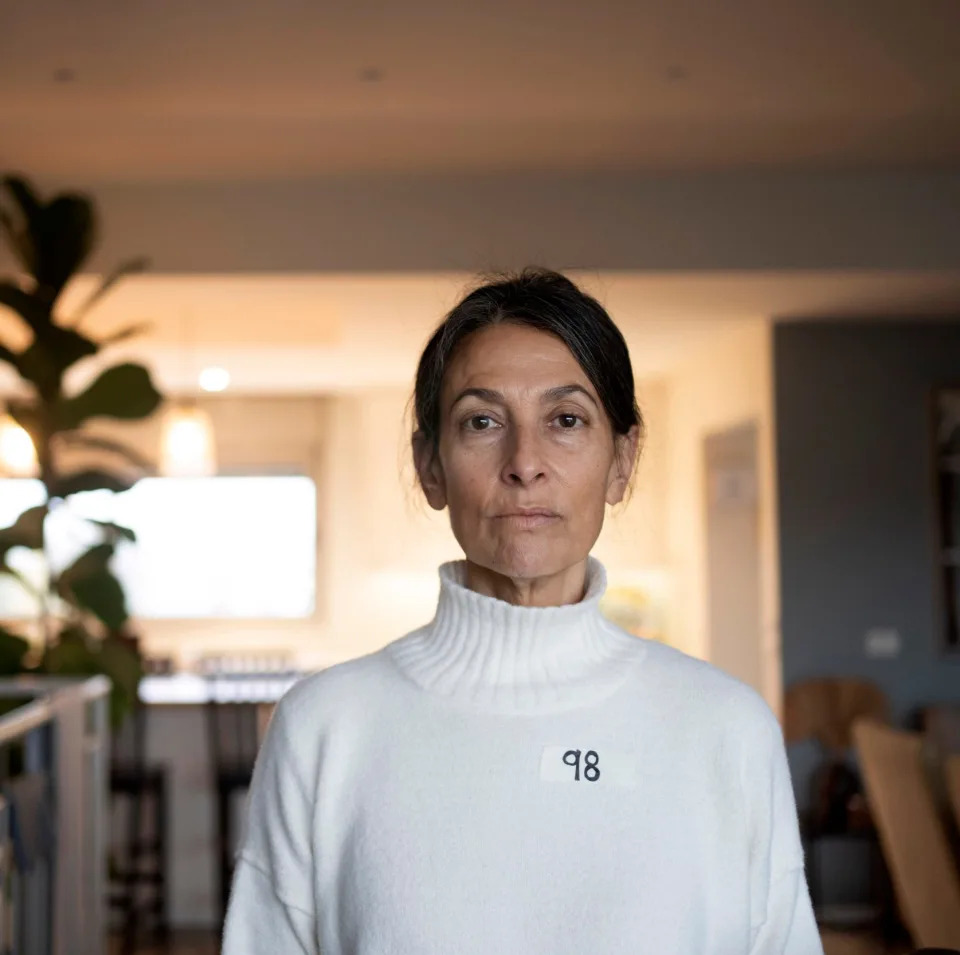
The Red Cross has said Hamas has denied it access.
Israeli officials are coming under increasing pressure to secure the release of the estimated 132 hostages still held in the Gaza Strip.
The Israeli prime minister’s office said on Friday that Israel had made an arrangement with Qatar that will allow the delivery of medicines to hostages held by Hamas in Gaza.
The medications would be given to the hostages “in the next few days”, the office said in a statement.
The Hostages and Missing Families Forum, which represents the families of hostages, said it would demand “visual proof” the medications had reached the hostages.
On Saturday, thousands of people gathered in Hostage Square in Tel Aviv at the start of the 24 period of events to mark 100 days since the attacks.
The rally in Hostage Square will feature a video message from Emmanuel Macron, the French President, and other world leaders. Similar events are scheduled in cities outside Israel, including London, New York and Paris.
The tireless campaign by families has gained widespread support and sympathy, ratcheting up pressure on the Israeli government to make concessions to win their release.
More than 100 hostages were released during a week-long truce at the beginning of December. Earlier this week, Israeli officials said they will not allow Palestinians to return to northern Gaza unless Hamas agrees to release more hostages.
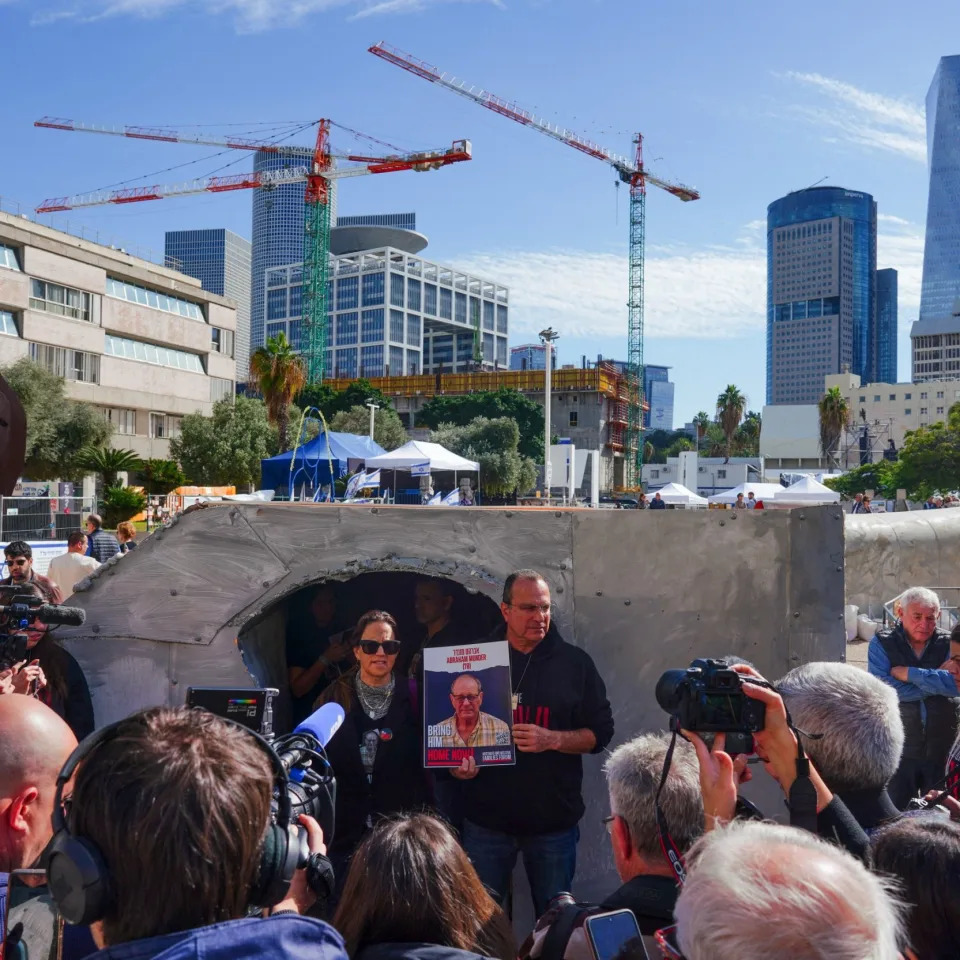
The repatriation of Gazans to their homes could be used as a bargaining chip during negotiations for hostage release.
Dorit Gvili of the Hostages and Missing Families Forum told Channel 12 News: “I think we need public pressure, there’s no other way.
“We must keep them in mind. We must say constantly that these people are alive and need to be returned. We feel the claustrophobia here every minute.”
Rachel Goldberg-Polin, 54, spends her days trying to bring her son Hersh and the other hostages home.
The mother-of-three sticks a piece of masking tape on herself with the number of days her only son has been held hostage in Gaza every morning.
Ms Goldberg-Polin, who began the ritual on day 26, pleaded with those around the world to adopt the same routine hoping the show of solidarity would help her and the other families bear the pain and anguish of waiting yet another day for their loved ones to return.
She said her identity is “the number of days he’s been stolen.”
In a message to her son, 23, she said: “We need you to stay strong. And survive and stay alive. And we are coming.”
Families remember Hamas hostages almost 100 days into Gaza war
Protesters and relatives of the Israelis Bibas Family release balloons during a gathering calling for the family immediate release from Hamas militants. Almost 100 days after Hamas militants abducted around 240 people from Israel to the Gaza Strip, their relatives on Saturday demanded decisive efforts to secure their release.
Almost 100 days after Hamas militants abducted around 240 people from Israel to the Gaza Strip, their relatives on Saturday demanded decisive efforts to secure their release.
In Tel Aviv, the Hostages and Missing Families Forum set up a replica of a section of tunnel, representing the vast underground network where Hamas is said to still hold more than 100 hostages.
The activist group planned a 24-hour rally during the evening to secure the release of the hostages.
Sunday will mark 100 days of Israel's war against the Islamist Hamas and other terrorist groups in the Gaza Strip.
The Gaza war began on October 7 when Hamas militants and allied factions killed 1,200 people in southern Israel and abducted hundreds more.
In response, Israel's military launched massive air strikes and a major ground offensive against Hamas in Gaza.
The hostages forum uses the square in front of the Tel Aviv Art Museum for exhibitions, installations and rallies to raise public awareness of the abductees.
Shiri and Yarden Bibas (both 32) and their children, 4-year-old Ariel and 12-month-old Kfir, are among the hostages being held by Hamas.
"We have no more time, we need them with us now," Yair Keshet, another member of the family, said at the opening of the tunnel replica.
Given that the Hamas-built tunnels run for hundreds of kilometres through the entire Gaza Strip, an Israeli military operation to free the hostages is regarded as unrealistic.
The tunnels are used as underground command centres, retreat and storage rooms, as well as transport routes.
Relatives of the hostages are now hoping for a negotiated solution to bring home their loved ones.
Families of hostages held in Gaza for 100 days hold 24-hour rally, beg government to bring them home
A man holds a sign calling for the release of the hostages taken by Hamas militants into the Gaza Strip during a demonstration at the Hostages Square in Tel Aviv, Israel, Saturday Jan. 13, 2024. Sunday marks 100 days that Israel and Hamas have been at war after Hamas' cross-border attack on Oct. 7 in which the group killed some 1,200 people, mostly civilians, and took 250 others hostage. In the Gaza Strip, health authorities say the death toll already has eclipsed 23,000 people.
The families of hostages held in the Gaza Strip kicked off a 24-hour rally in Tel Aviv Saturday night, calling on the government to bring their loved ones home after 100 days spent in Hamas captivity.
Thousands of people poured into “Hostages Ssquare” in Tel Aviv — a central plaza opposite Israel's Defense Ministry that has served as a gathering point for the campaigners.
Hamas and other Gaza militants captured some 250 people during its deadly Oct. 7 attack on southern Israel, while killing some 1,200 other people, most of them civilians.
More than 100 hostages were released during a temporary truce in November, but 132 remain held in Gaza including the remains of about two dozen who died or were killed.
“We were here on day 50 and spoke on this stage. We are not going to speak again in 50 days. It’s time to bring them back. Now! Bring them back!,” said Ronen Neutra, the father of Omer Neutra, an Israeli soldier who was taken. “They are being held in terrible conditions. They are starving. They are dying.”
There has been little visible progress toward a new deal to release hostages. Their families are using the 100-day mark for a new appeal to the government to prioritize bringing home the abductees. Some have said the government has not done enough.
Israel said Saturday that it had brokered a deal with mediator Qatar to deliver badly needed medicines to the hostages with the help of the International Committee of the Red Cross. There was no immediate sign that the deal was being implemented.
Osama Hamdan, a Hamas leader in exile, said Saturday in Beirut that the group was giving some of the available drugs in Gaza to hostages.
Near the rally in support of the hostages, anti-government demonstrators calling for new elections to be held blocked a major Tel Aviv highway, clashing with police who made arrests and tried to push the crowd back. Other protesters advanced toward Prime Minister Benjamin Netanyahu's private residence in the coastal town of Caesarea, calling for his dismissal from office.
In Tel Aviv, many of the protesters were planning to stay out all night. The crowd listened to a recorded message from French President Emmanuel Macron, and heard from the U.S. ambassador to Israel, Jacob Lew. Lew and Macron pledged to exhaust every effort to bring the remaining hostages home.
“Today, as we mark 100 days since hundreds of innocent men, women and children were violently seized from Israel, we join as one in demanding their release,” Lew said.
In previous exchanges of hostages for Palestinian prisoners, nearly all freed on both sides were women and minors. Now, 111 men, 19 women and two children remain in Gaza.



